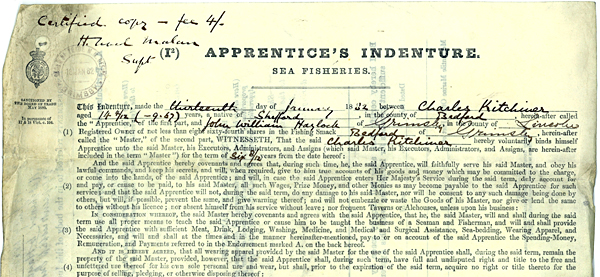Life on the Ocean Wave
A Life on the Ocean Wave
We are used to hearing the debate about the best way to deal with juvenile offenders, similarly there is currently much talk about how to get young people into work, neither of these discussions is new. What may surprise us is that at the end of the 19th century one option for the youth of land-locked Bedfordshire was a life at sea as part of the merchant navy.
As early as the 1830s people were looking for ways in which to make sure that youngsters who had committed crime were not turned into hardened criminals by spending time in gaol in contact with older criminals. In the 1850s this resulted in private reformatories being opened across the country. The idea behind reformatories was to offer training and education to the youths that would enable them to make an honest living. They became an accepted part of the justice system. The Reformatory School Act of 1854 allowed courts to send convicted juvenile offenders under 16 to a reformatory school for a period of 2 to 5 years. The first child sentenced in a Bedfordshire court to a reformatory was William Usher of Tempsford, aged 12. William was sentenced to 4 years and, after spending fourteen days in prison as required under the law, William was transferred to the reformatory at Northampton on the 16 July 1856.
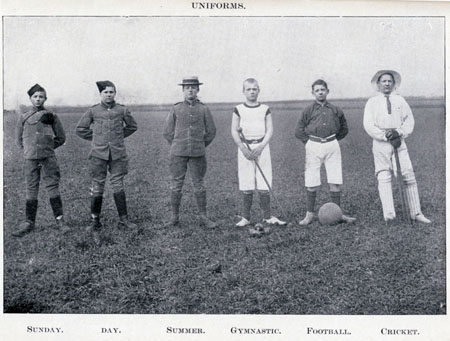
The Bedfordshire Reformatory at Carlton opened in 1857. The uniforms of the boys at Bedfordshire Reformatory (QRD1) are shown in the photograph above.
Parents of inmates were required to contribute to the cost by a payment of up to 5 shillings per week and this in itself could lead to a gaol term. The gaol database includes nine men imprisoned for non payment of reformatory contributions.
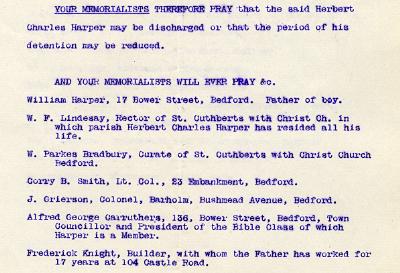
Reformatories always had limited success and by 1910 there was press criticism that they were schools for crime. Our document of the month (QSR1899/4/5/5,6 - above) shows that this attitude had prevailed for some time. In 1899 Herbert Charles Harper, a butcher's errand boy from Bower Street, Bedford, pleaded guilty of being involved in a theft from a house at Ravensden, although he took no active part in the housebreaking. Herbert was fourteen but was ordered to be sent to a reformatory for five years. This led to a petition to the Secretary of State on the grounds that the punishment was more severe than the circumstances of the case required and the period of detention exceeded the statutory limit. The memorialists also claimed 'the boy is a comparatively innocent child the training or discipline of a Reformatory is not really requisite for him and that there is a danger in his being sent to associate with older and more hardened offenders.' The petition was supported by 37 prominent men of Bedford including eight Justices of the Peace, four aldermen and three town councillors.
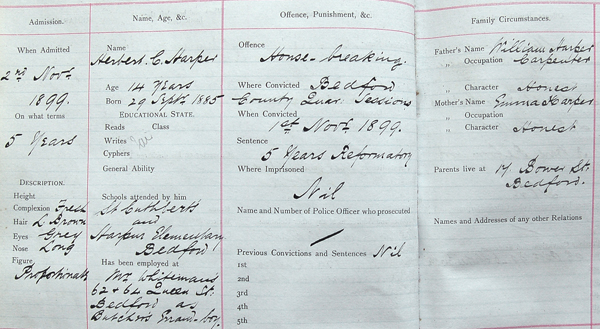
The petition seems to have had no effect. The admission register for the Bedfordshire Reformatory at Carlton shows that Herbert was admitted on the 2nd November 1899 (X521/5/3) and the next information we have is the management committee minutes for the 7 January 1903, which record that 'S Smith and Harper were recommended for licence to go to sea' (X521/1/3). According to the Superintendent's journal (X521/4/3) in May 1903 Herbert became a pantry man on the SS Thames. The discharge register (X521/6/2) shows what happened to Herbert next. Until 1907, long after his sentence had expired, the register records Herbert alternating between periods at sea and work for a butcher in St John's Bedford (below)
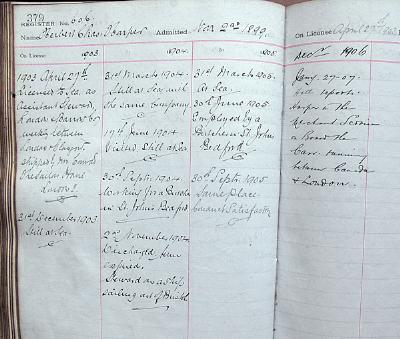
It is possible that Sidney Smith, who went to sea as an under cook in April 1903, and Herbert had already served some of their reformatory time at The Sailor's Home, London, which is mentioned in the entries for both boys. The Sailor's Home was a hostel for sailors when on shore, so it may have just been where the boys were expected to stay, however, from 1893 it had also been the London School of Nautical Cookery.
Some boys were sent straight to reformatory ships. Of nearly 200 children on the
gaol database sentenced to reformatories, one - twelve year old Frederick Eccles, was sent to the Cornwall at Purfleet in 1866 – and nine boys were sent to the Akbar at Liverpool , between 1868 and 1876. There is some more detail of the
Akbar on the Paths to Crime blog.
Even when children had avoided crime parents and guardians were anxious to get them into employment or training and the Poor Law Unions were on the look out for opportunities to place children in their care into work. The archives of Ampthill Poor Law Union contains a selection of letters relating to three boys who they placed with the fishing fleet at Grimsby. Once again we know how the lads turned out because the Union asked for regular reports. (PUAC3/57 - below):
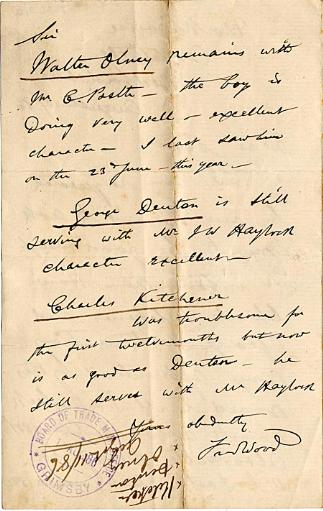
Mr Postle, sent the union a bill for Walter Olney's clothing (PUAC3/6):
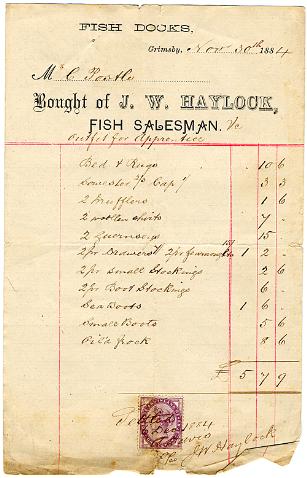
Apprenticeship indenture for Charles Kitchener (PUAV36/25):
